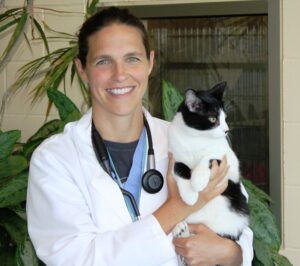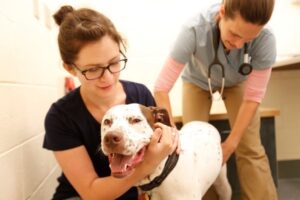-
Adopt
-
Veterinary Care
Services
Client Information
- What to Expect – Angell Boston
- Client Rights and Responsibilities
- Payments / Financial Assistance
- Pharmacy
- Client Policies
- Our Doctors
- Grief Support / Counseling
- Directions and Parking
- Helpful “How-to” Pet Care
Online Payments
Referrals
- Referral Forms/Contact
- Direct Connect
- Referring Veterinarian Portal
- Clinical Articles
- Partners in Care Newsletter
CE, Internships & Alumni Info
CE Seminar Schedule
Emergency: Boston
Emergency: Waltham
Poison Control Hotline
-
Programs & Resources
- Careers
-
Donate Now
 By Kate O’Hara, DVM
By Kate O’Hara, DVM
generalmedicine@angell.org
angell.org/generalmedicine
617-522-7282
More pet owners are becoming aware of a genetic predisposition in some dogs for adverse reactions and sensitivities to several different drug classes. This predisposition is particularly strong in the herding-breed group of dogs and is caused by a mutation at the MDR1 (Multi-Drug Resistance) gene. It is important for both pet owners and veterinarians to be aware of this condition as the associated adverse drug reactions it can lead to can sometimes be severe and potentially fatal.
 The MDR1 gene encodes for p-glycoprotein which is an important component of certain cell membranes and which acts as a pump to help clear possible toxins from the cells. P-glycoprotein plays a particularly important role in the cells of the blood-brain barrier where it helps to keep drugs and other chemicals from entering the brain. It also acts in the biliary system, intestine, and kidney to promote drug excretion into bile and urine and out of the body. Mutation of the MDR1 gene results in production of an abnormally short and ineffective p-glycoprotein. The defective p-glycoprotein allows a higher level of drugs to enter the brain leading to an increased sensitivity to certain drugs and increasing the toxic neurologic side effects of some medications.
The MDR1 gene encodes for p-glycoprotein which is an important component of certain cell membranes and which acts as a pump to help clear possible toxins from the cells. P-glycoprotein plays a particularly important role in the cells of the blood-brain barrier where it helps to keep drugs and other chemicals from entering the brain. It also acts in the biliary system, intestine, and kidney to promote drug excretion into bile and urine and out of the body. Mutation of the MDR1 gene results in production of an abnormally short and ineffective p-glycoprotein. The defective p-glycoprotein allows a higher level of drugs to enter the brain leading to an increased sensitivity to certain drugs and increasing the toxic neurologic side effects of some medications.
The MDR1 gene mutation is hereditary and is passed from parents to offspring. Each dog inherits 2 copies of the MDR1 gene—1 copy from each parent. Animals that inherit 2 abnormal copies (homozygous) will produce no normal p-glycoprotein and will be most strongly affected. These homozygous dogs will also always pass the gene on to their offspring. Dogs that inherit only one abnormal copy of the MDR1 gene (heterozygous) can show some effects though they will be less severely impacted because some normal p-glycoprotein will still be produced. These heterozygous dogs will have a 50% chance of passing on the defective gene.
As previously mentioned, dogs of herding breed ancestry are most commonly affected. In fact, all dogs affected by the MDR1 mutation are thought to be descendants of a single dog that lived in Great Britain before breed isolation. Approximately 70% of collies carry the MDR1 gene mutation. Other affected breeds include long-haired whippets, Australian shepherds, silken windhounds, McNab shepherds, English shepherds, Shetland sheepdogs, German shepherds, and old English sheepdogs. However, because dogs can be at risk with only 1 copy of the mutation, many mixed breed dogs also can be affected, including dogs that may not necessary “look” like they have herding dog ancestry.
It is important to have dogs tested for the MDR1 gene mutation, especially at-risk breeds. This information is important not only for making medical management decisions for the dog, but also for identifying dogs that could potentially pass this mutation on to offspring. In the past, testing for the MDR1 gene mutation was primarily done through the Veterinary Clinical Pharmacology Laboratory (VCPL) at Washington State University—the laboratory that first discovered the mutation. There are now a number of laboratories that offer the test. Testing can be performed either on a cheek swab or a blood test, and owners can order a test kit directly from the laboratory or have it submitted through their veterinarian.
In animals with decreased p-glycoprotein function, certain drugs should be avoided altogether or used at a reduced dosing. The most serious adverse drug reactions that have been noted involve several antiparasitic agents (including the macrocyclic lactones), several cancer drugs, and certain gastrointestinal medications (including the antidiarrheal agent loperamide [Imodium]). Reactions have also been reported with specific sedatives, pre-anesthetic medications, and some antibiotics. Macrocyclic lactones are an important group of antiparasitic drugs in veterinary medicine. This group (including such drugs as ivermectin, milbemycin, moxidectin, and selamectin) is commonly used for the prevention of Heartworm disease in dogs. It is important to note that all of the FDA-approved heartworm preventatives licensed in the US are considered safe for dogs with MDR1 gene mutation when used according the labeled doses. However, higher doses of these medications used to treat other parasitic conditions may be toxic in dogs with the MDR1 gene mutation.
Not all drugs must be avoided in animals with defective p-glycoprotein, and many drugs can be used safely with no need to alter dosing. These drugs often have characteristics such as a wide therapeutic dose range, minimal neurologic toxicity, or an alternate drug clearance mechanism from the body which make them better tolerated in dogs with p-glycoprotein dysfunction. Despite this, many owners may be nervous about using any medications in dogs with the MDR1 mutation. This apprehension may be reinforced by misinformation on some websites. It is important for pet owners and veterinarians to know which drugs are safe and which will need to be avoided or dose-reduced in these animals so that medical care is not mistakenly withheld. VCPL at Washington State University continues to research which drugs should be avoided in MDR1 gene mutation dogs and their website includes many good resources for pet owners and veterinarians.
Finally, it is important to note, that while this article focuses on the inherited MDR1 gene mutation in dogs, a similar but distinct mutation has also been reported in cats. Additionally, there are also some drugs which can interfere with p-glycoprotein function in normal dogs and can mimic the effects caused by the MDR1 mutation. To avoid causing p-glycoprotein-associated drug reactions, it is important for veterinarians to consider both causes for p-glycoprotein dysfunction.